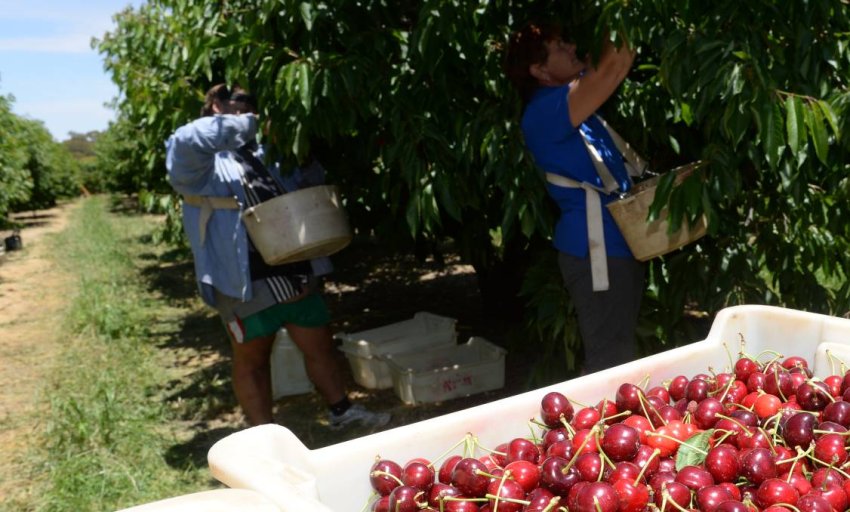
The Fair Work Commission (FWC) ruled on November 3 that workers picking fruit and vegetables on piece rates must be guaranteed a minimum wage.
The full bench said the existing pieceworker provisions “are not fit for purpose” and that it did “not provide a fair and relevant minimum safety net”. It said this is necessary to ensure horticulture is governed by the modern awards objective.
Piece rates mean someone is paid according to the number of “pieces” they harvest: the more fruit or vegetables picked, the more they are paid. This often means the worker is paid below the legal minimum wage.
The Australian Workers Union (AWU) lodged a minimum wage claim with the FWC in December last year. It argued every worker should be guaranteed a minimum casual rate, currently $25.41 per hour. The United Workers Union supported the AWU’s minimum wage claim.
AWU national secretary Dan Walton described the ruling as one of the most significant industrial decisions of modern times. “Fruit pickers in Australia have been routinely and systemically exploited and underpaid,” he said. “Too many farmers have been able to manipulate the piece rate system … Now it will be easy for workers — even if they don’t have good English language skills or Australian connections — to understand if they’re being ripped off.”
Walton told a November 17 seminar, sponsored by Unions NSW, that the horticultural industry was “a centrepiece for exploitation”.
“It is not just a question of wage theft, but illegal deductions from take-home pay. Violence, human trafficking and sexual assault has also been widespread in the industry.”
He said the farm worker wage case was supported by several regional farming areas, such as Coffs Harbour, and backed by the Labor governments of Queensland, Victoria and Western Australia, as well as the Australian Council of Social Service.
The Australian Fresh Produce Alliance, the Australian Industry Group and the National Farmers Federation opposed the push for a minimum wage. They are reportedly considering an appeal, backed by the federal government.
More that 80% of horticultural workers are migrants, either on temporary work visas or undocumented. The Seasonal Worker Program is one of the common pathways.
According to an article in The Conversation on November 10 “in 2020–21 it provided about 12,000 of the roughly 80,000 strong (formally employed) seasonal work force”.
“Unlike the Working Holiday Maker scheme, Seasonal Worker Program visas are typically arranged by labour hire companies, who recruit and then place overseas workers on client farms. Under the condition of the visa, workers can only work for that one employer. Employers in turn are obliged to provide things like accommodation. But this can become a further opportunity for exploitation, through overcharging workers for rent.”
This is the context for the federal government’s racist campaign against seasonal workers it accuses of “absconding”. It stated that 1181 workers absconded in the past financial year, up from 225 the year before.
The campaign warns visa holders against leaving their designated employer to seek (better paid) work elsewhere, saying it will cancel their visa, refuse them more work and implies that family members will be similarly refused.
This attack on so-called “absconding” seasonal workers is a clear case of victim blaming.
“Australia’s migrant slave economy has been exposed once again with labour hire firms being accused of exploiting seasonal workers in Australia’s agricultural sector,” Leith van Onselen said in MacroBusiness on November 4.
Stewart Levitt of Levitt Robinson is preparing a class action on behalf of Pacific Island workers, who are often forced to pay huge deductions for accommodation and transportation. In some cases the deductions have reduced seasonal worker take-home pay to less than $300 a week.
Levitt said the federal government’s Pacific Seasonal Worker Program had led to a “pandemic of worker abuse”. He likened the program to “blackbirding”, the 19th century practice of coercing South Sea islanders to work in Queensland’s sugar cane fields.
Despite the rampant exploitation, the federal government recently launched its Agricultural Visa program that will provide pathways for permanent residency for workers from 10 South East Asian nations, provided they pledge to become indentured with an employer for at least three years.
“The horticultural industry is ground zero for migrant wage theft, exploitation and ‘modern slavery’. The proof is undeniable, van Onselen said. The government’s agricultural visas “will only make the power imbalance and exploitation even worse”.